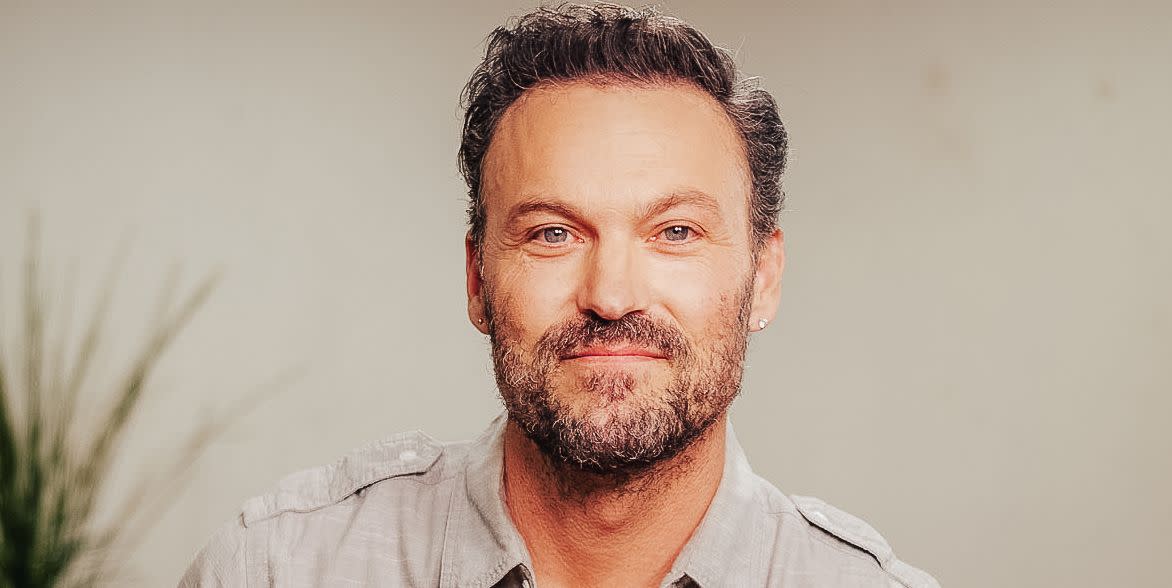What Brian Austin Green Wants Men to Know About Prostate Cancer

- Oops!Something went wrong.Please try again later.
Brian Austin Green has taken on many roles since he starred in the classic 90s TV show,Beverly Hills, 90210. In case you forget just how often you’ve seen him on screen since then, we’ll mention Terminator: The Sarah Connor Chronicles, Anger Management, The Conners, Domino, and even Dancing With The Stars.
But right now, the part he’s most interested in playing is advocate. Last June, he revealed in a vulnerable and personal Instagram post, that he’d “disappeared from Instagram for a while” due to a tough bout of ulcerative colitis. The inflammatory bowel disease flare-up left him more or less bedridden for six weeks.
His disease also makes him more vulnerable to prostate cancer than the average guy. And that’s pretty vulnerable, given that the average guy already has a 1 in 8 chance of testing positive for prostate cancer in their lifetimes. Every year, more than 268,000 new cases of prostate cancer are diagnosed, according to the American Cancer Society, and about 34,500 die from it each year. It wasn’t just his own increased risk of prostate cancer that alarmed Green. It was the magnitude of the lifetime risk for all men.
The way to decrease your risk of dying of prostate cancer is to get screened for it. Yet many men don’t do it. And Green is trying to help turn that around. He’s become a champion for Stand Strong for Men’s Health, a campaign which seeks to encourage men to be proactive about getting screened for prostate cancer and help end the disease.
His own first step: Getting a PSA test to find out his own health status. “Testing is so easy at this point,” Green stresses. “It’s a simple blood draw. I just did it myself, it took all of five minutes in my doctor’s office, and I got the results the very next day. I know now I’m good for a year. I love the concept of making a PSA test normal, by saying, I go to the dentist regularly to get my teeth cleaned, so I need to go to the doctor annually, too. Just like you regularly go to get your hair cut.”
Some men drag their feet, maybe because they prefer not to know if something’s wrong. Green gets that fear of bad news, but says that he feels this is something you need to push past. “I think men have this tendency to wait until they feel something is wrong to go to the doctor,” he says. “Lots of times, they then end up playing catch-up with a health problem. For many men, prostate cancer is luckily not a super-aggressive form of cancer, but for others, there can be complications. So there’s really no excuse for a man not to get a PSA test. You need to be ahead of the curve.”
Screening is key because prostate cancer doesn’t always announce itself at all. And when it does, symptoms can look different in different men. “Men should take note of any problems urinating, including more frequent urination, loss of bladder control or a slow or weak urinary stream. Blood in your urine or semen, as well as erectile dysfunction, are also important to look out for. Other warning signs are pain in areas including your hips, back, or chest, as well as weakness or numbness in your legs or feet,” says Brandon Mahal, M.D., vice chair of research and assistant professor of radiation oncology at the University of Miami Miller School of medicine’s Sylvester Comprehensive Cancer Center.
You can get a PSA test from your primary care physician—it’s a simple blood test. Talk with your provider about what age is best for you to start getting this screening test. Soon, there may be additional ways to test for this cancer early. The Prostate Cancer Foundation—a partner along with Depend in the Stand Strong for Men’s Health initiative—also is furthering research into new, cutting-edge detection and treatment techniques. Those include a type of scan that lets doctors track hard-to-see prostate cancer earlier and more effectively than current imaging.
In the end, Green’s message to other men is all about compassion–staying on top of your health means caring for yourself, and the people in your life. “Love yourself,” Green stresses. “Love the people around you. Take the best care of yourself that you can, because you’re not as bulletproof as you think you are.”
You Might Also Like

